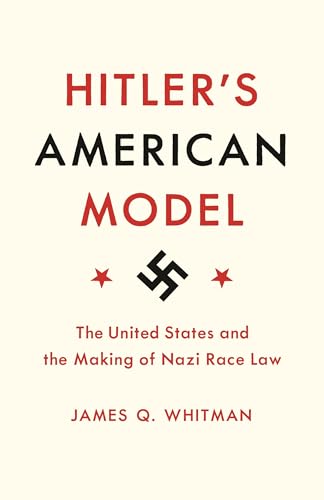Hitler's American Model
The United States and the Making of Nazi Race Law
James Q. Whitman
BOOK REVIEW

In a gripping exploration that defies the very fabric of our historical narratives, Hitler's American Model: The United States and the Making of Nazi Race Law by James Q. Whitman unravels the chilling connections between American racial policies and the atrocities of Nazi Germany. This is not just a book; it's a masterclass in the disturbing intersections of ideology and power, throwing light on how the racial laws that fueled genocide were partially inspired by American precedents. The moment you delve into these pages, you're not just reading history; you're confronting the uncomfortable truths about American identity and the dark shadows it casts.
Whitman's analysis is an intellectual wake-up call, leaving no room for complacency. He meticulously dissects how the United States served as a model for Nazi racial legislation, exemplifying the American embrace of eugenics, segregation, and racial purity ideologies. The author does not shy away from the shocking realization that the very policies used to justify racial oppression in the U.S. directly influenced the Nazi regime's approach to race law. This revelation is as disheartening as it is enlightening; it forces you to reconsider the narrative of American exceptionalism and the moral high ground often claimed by the United States.
The emotional weight of Whitman's arguments is palpable; he evokes a visceral understanding of the stakes involved in this historical reckoning. Readers are compelled to grapple with the visceral implications of these connections-how the echoes of America's racial tensions reverberated across the Atlantic, emboldening a regime that would ultimately lead to the Holocaust. This is not merely academic discourse; it is a profound moral inquiry that thrusts you into the depths of human cruelty and complicity.
Whitman doesn't just present facts; he challenges you to confront the implications of these historical realities. He brings to life the voices of those impacted by these laws, adding a heartbreaking dimension that intertwines personal stories with systemic injustice. Whether discussing the Jim Crow laws of the South or the sterilization practices justified through the guise of 'American progress', each argument is a reminder that these were not distant occurrences, but rather tangible manifestations of deeply ingrained ideologies.
Critics of the book have raised eyebrows, pointing to how Whitman's conclusions might oversimplify complex historical dynamics. Some argue that while parallels can be drawn, the nuances of European anti-Semitism and American racism shouldn't be conflated. Yet isn't that precisely the point? By examining these connections, Whitman invites a necessary discourse about the lessons we must confront as a nation grappling with its flawed legacy. The controversies amongst readers make the book all the more vital-it gets people talking, analyzing, and questioning, which is essential for progress.
Upon finishing, it's hard to walk away unaffected. The echoes of this research resonate in contemporary discussions about race, society, and justice. Whitman's work embodies a profound call to awareness, nudging us towards a collective reckoning with our past, urging the realization that history does not exist in a vacuum.
In a world currently facing global upheaval around issues of race and identity, Whitman's assertions are a stark reminder of what can happen when ideologies go unchecked. The urgency of the message cannot be overstated-understanding our history is crucial to reshaping a more equitable future. As you close the final pages, you may feel an overwhelming sense of dread, but also a spark of hope, the possibility of change sparked by awareness.
So, are you prepared to face the unsettling realities stitched into the fabric of our history? Hitler's American Model isn't just another book on a shelf-it's a catalyst for conversation, a clarion call to scrutinize who we are and who we want to be. Don't miss the chance to engage with this formidable work; the insights it offers are not just relevant-they're essential.🌍
📖 Hitler's American Model: The United States and the Making of Nazi Race Law
✍ by James Q. Whitman
🧾 232 pages
2018
#hitlers #american #model #united #states #making #nazi #race #james #whitman #JamesQWhitman